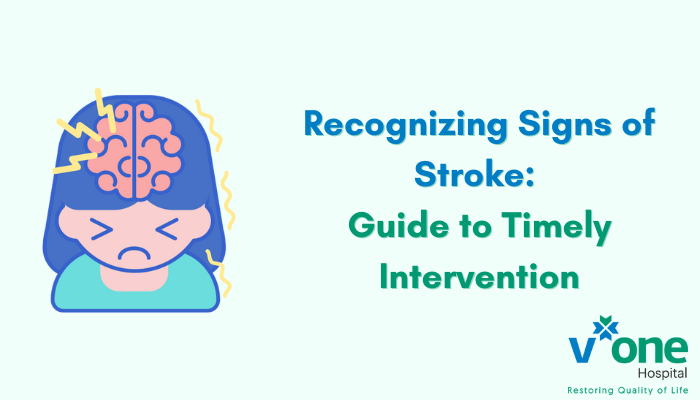Recognizing Signs of a Stroke: A Guide to Timely Intervention
Every year, thousands of lives are forever altered by strokes. A stroke can happen to anyone, at any time, but recognizing the signs and acting quickly can make all the difference. In this guide, we’ll break down the critical information you need to identify the signs of a stroke and understand the importance of timely intervention.
What is a Stroke?
Before we delve into recognizing the signs, let’s understand what a stroke is. A stroke occurs when the blood supply to a part of your brain is suddenly interrupted or reduced. This can happen because of a blood clot or a burst blood vessel. When the brain doesn’t get the oxygen and nutrients it needs, brain cells can start to die within minutes. That’s why prompt action is crucial.
Know the Signs: FAST
To help you remember the signs of a stroke, think FAST:
- Face Drooping: Is one side of the person’s face drooping or numb? Ask them to smile. If their smile is uneven, it’s a red flag.
- Arm Weakness: Ask the person to raise both arms. Does one arm drift downward? Weakness or numbness in an arm is a warning sign.
- Speech Difficulty: Listen to their speech. Is it slurred or strange? Can they repeat a simple sentence correctly? Trouble speaking is a clear indicator.
- Time to Call Ambulance: If you observe any of these signs, it’s time to call ambulance immediately. Time is of the essence in stroke cases.
Additional Symptoms
While FAST is an excellent mnemonic for recognizing strokes, there are other signs and symptoms to be aware of:
- Sudden Severe Headache: A sudden, intense headache with no known cause could indicate a stroke.
- Trouble Seeing: Vision problems in one or both eyes, such as blurred or blackened vision, can be a warning sign.
- Dizziness or Loss of Balance: If someone suddenly feels dizzy, unsteady, or experiences a loss of coordination, it’s cause for concern.
- Confusion: Sudden confusion, trouble understanding, or difficulty in speaking can also be stroke symptoms.
Immediate Action Saves Lives
If you or someone you’re with experiences any of these symptoms don’t wait or try to tough it out. Time is absolutely critical when dealing with a stroke. The sooner medical help is sought, the better the chances of a full recovery.
The Golden Hour and Emergency Care Units Near You
Medical professionals often refer to the “golden hour” – the first 60 minutes after a stroke. During this time, rapid treatment can minimize damage and improve outcomes.
Emergency responders and hospitals have specialized stroke teams and treatments that can make a significant difference. Getting to the hospital quickly can mean the difference between full recovery and long-term disability. That’s why it’s essential to know where the emergency care unit near you is located.
Risk Factors for Stroke
Understanding the risk factors for stroke is also essential. Some risk factors are beyond our control, like age and family history. However, there are many lifestyle-related factors that we can manage:
- High Blood Pressure: This is the most significant risk factor for stroke. Regular check-ups and medication, if necessary, can help control it.
- Smoking: If you smoke, quitting is one of the best ways to reduce your stroke risk.
- Diabetes: Keep your blood sugar levels in check with a healthy diet and regular monitoring.
- High Cholesterol: Manage your cholesterol levels through diet, exercise, and medication if needed.
- Obesity: Maintaining a healthy weight through diet and exercise can significantly lower your risk.
- Physical Inactivity: Get moving! Regular exercise is key to reducing stroke risk.
- Excessive Alcohol: Limit alcohol consumption to reduce your risk.
- Atrial Fibrillation: If you have an irregular heartbeat, consult your doctor for proper management.
Prevention is Key
The best way to deal with a stroke is to prevent it from happening in the first place. By managing risk factors and making healthy lifestyle choices, you can significantly reduce your chances of experiencing a stroke.
Wrapping Up
Strokes are sudden, life-altering events, but recognizing the signs and taking immediate action can save lives and improve outcomes. Remember the FAST acronym, and if you suspect a stroke, call an ambulance without delay. Understanding the risk factors and making positive lifestyle changes can also go a long way in preventing strokes.
Your health and the health of your loved ones are precious. Stay informed, stay vigilant, and together, we can combat the threat of strokes with the help of emergency care and trauma care units near you.

